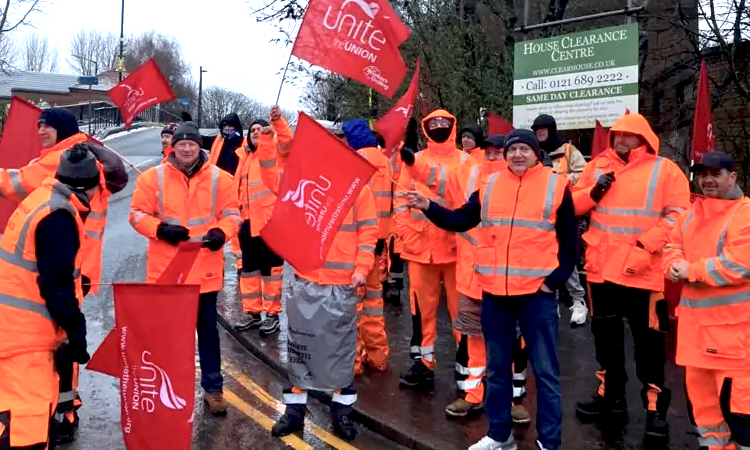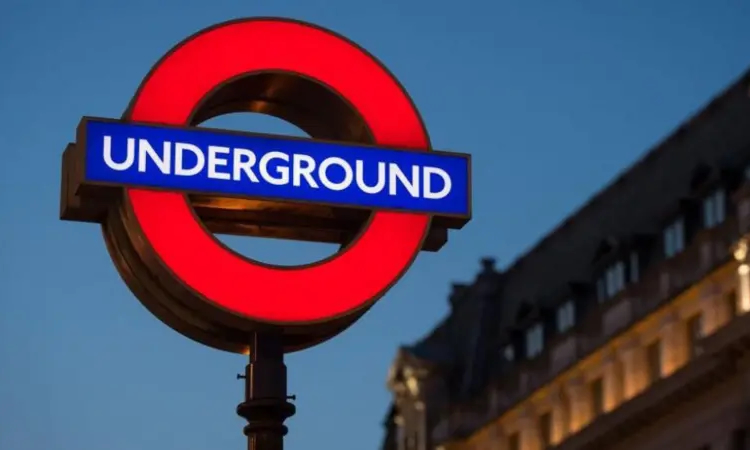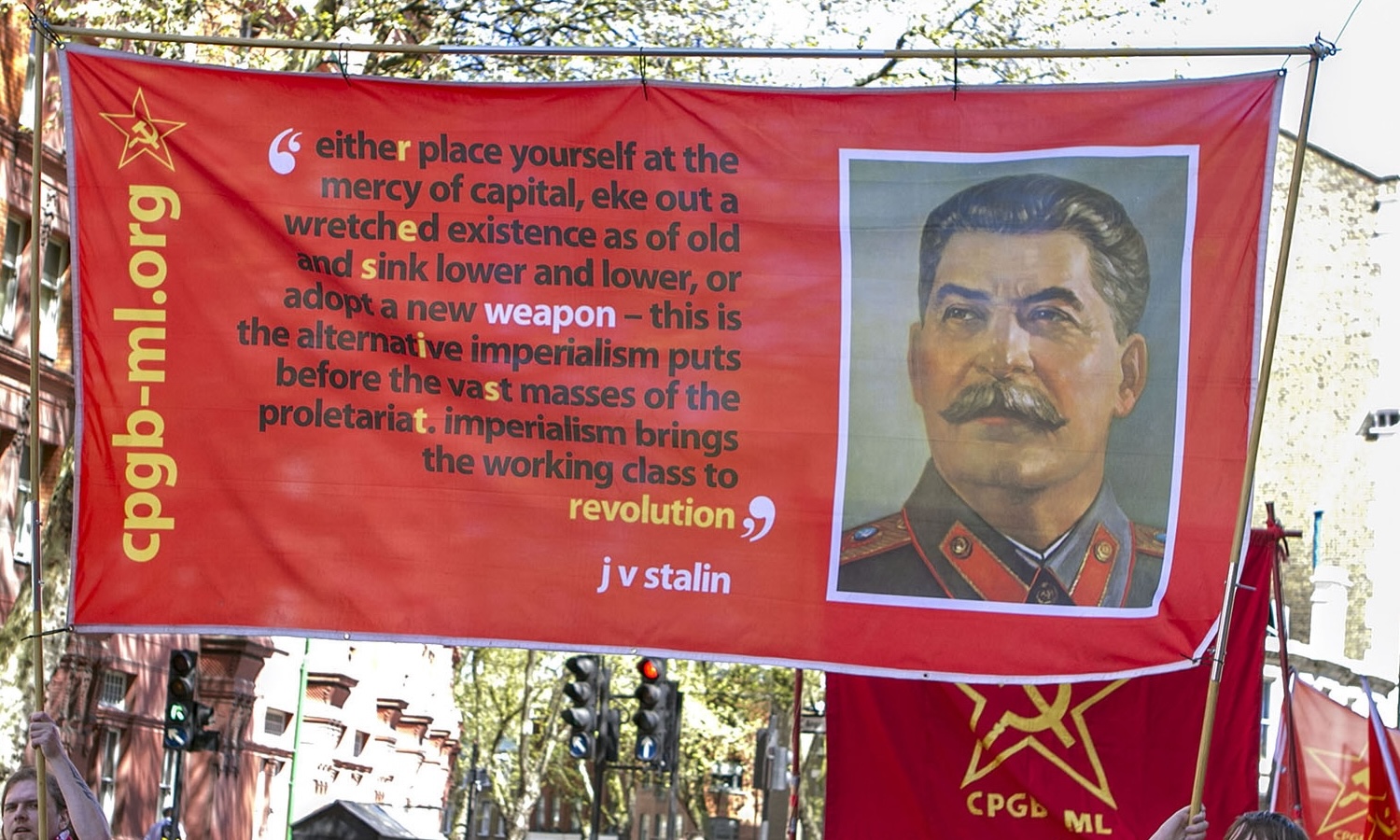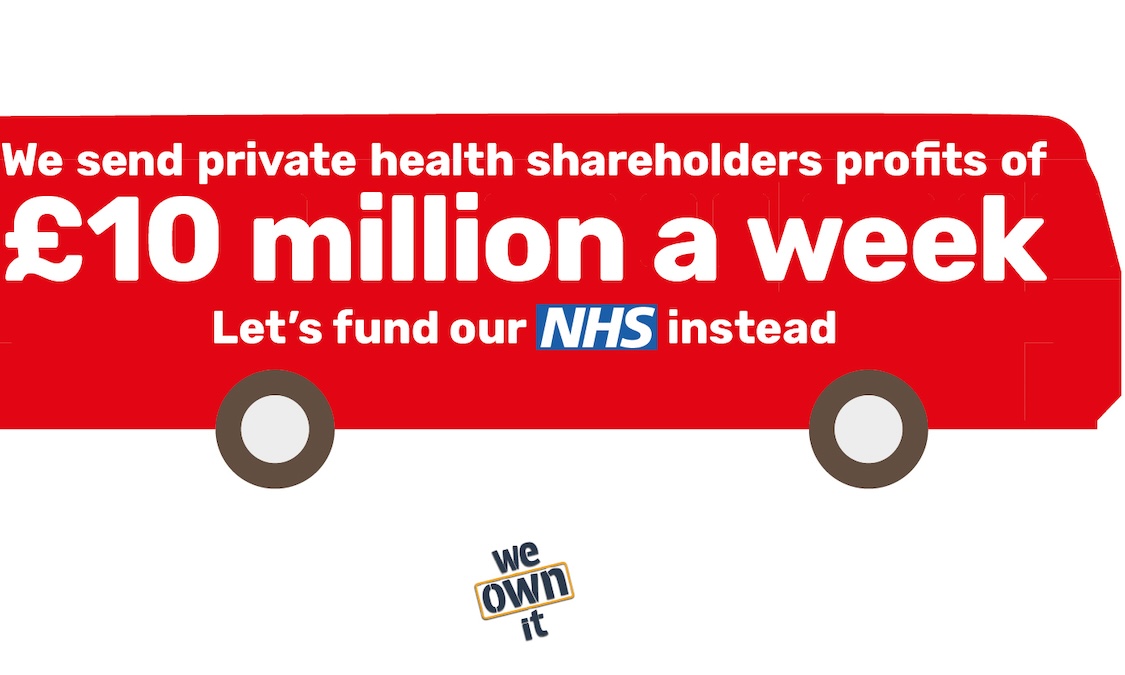Read the October 2025 issue of our industrial matters free sheet as a pdf.
Index
- Save the British steel industry!
- Birmingham bin strike: ‘Mega-Picket 2’
- Drivers’ strikes in Bristol and Bath symptomatic of nationwide bus crisis
- Chaos in London as Tube strikes bite
- No Deportations! Defend the TfL workers!
- Hull Trains stooge promoting bosses’ lies
- Wrack’s massive mandate
- The unions we need
Save the British steel industry!
The threatened closure of Liberty Speciality Steels UK in the Yorkshire towns of Rotherham, Stocksbridge and Brinsworth would be a mortal blow to the British steel industry.
Steel in Britain has been privatised, nationalised, sold, re-sold, asset stripped and thrown around like a hot potato between multinationals for nearly 40 years.
There have been government bailouts, weasel words about ‘preserving the industry’ and cowering behind allegedly ‘green steel’ production, while lavishing vast sums of cash on the industry to disguise the realities of closures and redundancies.
The bailouts, as always, were to save capitalists and their broken, failed system, not workers.
The steel unions will do no more than salvage the best possible redundancy deal for the affected workers.
Yet the entire British steel industry is at stake: when the mills are closed, the jobs are gone and the skills that steel workers have honed over years have become museum pieces, future generations of potential steel workers in Yorkshire will have been betrayed.
Workers have been laid off on 85 percent pay whilst the future of Liberty Steel is decided.
This is a deliberate and cynical ploy to keep them from their workplaces while their futures are decided – breaking their morale, undermining their collective strength and eroding their class consciousness.
It is simply unacceptable that workers sit at home taking a pittance in furlough pay, or coming to work for just one week out of six, waiting for the final closure and the redundancy notice to arrive and crossing their fingers that the government will arrive on a white horse to save them.
Through our unions, our communities and all the bonds which bind us, workers need to take physical control of our workplaces.
Steel workers must make every steel mill under threat of closure a fortress of resistance.
Unity is our strength – workers MUST stand and fight!
Seize the sites now before the steel mills become rusted wastelands!
Birmingham bin strike: ‘Mega-Picket 2’
On 25 July, comrades from the party visited the ‘Mega Picket 2’ in Birmingham to support the striking bin workers, who have been on an all-out strike since March.
The dispute centres around the city council’s attempt to abolish the Waste Recycling and Collection Officer role, which will mean that affected workers will see their salaries slashed by up to £8,000 per year.
There are some 350 workers involved in the strike, yet this ‘mega-picket’ in July could barely summon more than 250 people. Unite the Union, which represents the workers, has failed to engage other workers in this dispute, while the broader trade union movement has only managed to publish an open letter in the Morning Star in May, addressed to the then-deputy prime minister Angela Rayner (see August issue of The Spark).
Speakers at the second mega-picket included Jeremy Corbyn and Steve Wright, recently-elected general secretary of the Fire Brigades Union (FBU).
But not a single speaker, including Corbyn and Wright, had any solution to offer to the picketers, only empty rhetoric about “organising in a trade union” and the usual tired platitudes to Labour-style social democracy.
The bin workers in Birmingham have been fighting against their council for months, yet they have for the most part been fighting this battle alone.
With the strike ongoing and their mandate to strike freshly renewed, it appears that there is no end in sight and the leaders of Unite have no idea how to resolve it.
Drivers’ strikes in Bristol and Bath symptomatic of nationwide bus crisis
Over 1,000 First West of England bus drivers took strike action in September in their dispute over pay.
Unite members rightly rejected First’s insulting pay offer: a two-year deal of just £1 an hour increase until March 2026, then another 30p an hour from April 2026. The offer for new starters was even worse – only 50p an hour extra, rising by a pitiful 10p per hour from next April.
First Group’s operating profits hit £204.3m in 2024 and dividends to shareholders increased by 45 percent. While parasitic shareholders enjoyed this windfall, bus workers whose toil created the profits that First Bus shareholders pocket, are standing on picket lines to win a decent wage increase.
Britain’s provincial bus crisis goes back nearly 40 years: it is the result of exploitation and profiteering caused by privatisation. Before 1986, buses were either state-run or under local control and were often more efficient.
Privatisation was sold with the lie that ‘competition’ would improve services and drive down fares. Instead, ‘bus wars’ broke out in major towns and cities, with companies using underhand tactics to eliminate competitors.
After the chaos abated, five monopolies emerged, controlling 70 percent of Britain’s buses between them, delivering sub-par services while extracting maximum profits. Which of course meant driving down pay for staff, cutting unprofitable services and hiking fares to astronomical levels for passengers.
In Bristol, our sources tell us that several factors are hampering the strikers’ efforts to achieve a decent pay settlement. These are instructive, as they reflect a situation that can be found across much of the British workforce today, much of it resulting from the vice-like constraints of Britain’s extensive anti-trade-union legislation.
We may, in theory, have the right to strike. But in practice we find that this right is so curtailed as to be almost meaningless.
The first problem is the division of workers between different employers, with different terms and conditions, separate pay offers etc.
In Bristol, for example, one out of three depots has accepted a pay deal that was rejected by the other two. Even where the staff work for the same employer, each depot is treated separately by employers – and, critically, by the union as well.
Where formerly bus drivers worked and struggled together, now they are broken into ever-smaller groups. There is widespread recognition amongst workers that this situation stymies them when they need to take action in defence of their pay and conditions, and there is a real desire to overcome these divisive practices, but too often it seems that union officials are reluctant to do anything towards reversing this fragmentation.
They are more likely to hide behind it, claiming not to be able to do anything that would enable a wider mobilisation for any action. Joint union meetings between depots are never organised that might help the workers break down the divisions created by their employers.
Meanwhile, those on strike also have a plethora of regulations that prevent them from making their action public: any picket-line demonstration of more than six people can be broken up by police, and under the terms of drivers’ contracts no media interviews are allowed by anyone other than union officials.
As a result, much of the wider public remains in ignorance about the dispute and other unions are slow to deliver any solidarity – even by visiting picket lines to show their support.
Many workers are acutely aware of the fact that Labour governments and politicians as much as the Tories are the enemies of the working people and the architects of their troubles. They resent the money their unions spend on propping up the Labour party and the result is a huge and ever-growing disconnect between the careerist bureaucrats at the top of the unions and the rank-and-file memberships at the bottom.
Despite all these difficulties, our sources tell us that there is a strong appetite to continue the strikes until victory. They are determined to press on with their struggle to secure fair, back-dated pay.
Their union must support them by refusing all further negotiations until the government and First Bus have felt the full force of working-class solidarity.
Chaos in London as Tube strikes bite
London’s Tube network ground to a halt for five days as workers walked out in their dispute over pay.
London’s Tube network ground to a halt for five days as work- ers walked out in their dispute over pay.
The strikes, which ran from 7-11 September, brought the vast majority of the network to a standstill as workers across a raft of functions including fleet maintenance, station staff, train drivers and service control carried out a series of coordinated strikes across the five-day period.
The workers have rejected a paltry 3.4 percent pay offer from London Underground’s management and have grown sick and tired of inflation-only pay rises from their employer, going back to 2020.
Indeed, in 2022 workers received an 8.4 percent inflation- linked pay rise, only for inflation to continue to skyrocket to 11.6 percent later the same year, totally subsuming the pay rise and leaving workers worse off than they had been to start with.
The fact that the press organs of the ruling class, including the Daily Telegraph, chose to vilify the workers for the en- tirety of the five days of action, characterising all the strikers as ‘train drivers’ when in fact train operators are in the minority of workers who took strike action, serves as proof that the ruling class continues to fear working-class organisation wherever they find it.
It also indicates that unionised and well-organised workers can still land a heavy blow on employers and their ruling-class masters.
No Deportations! Defend the TfL workers!
The Home Office’s decision to increase the salary thresh- old for UK Skilled Worker and Health and Care Visas to £41,700 per year will leave dozens of Transport for London workers facing deportation.
Changes to visa thresholds, which came into effect in July, have been implemented by a Labour government that is presented as ‘responding to pressure’ from a rising Reform party.
In reality, the bidding war over who can be ‘toughest on migrants’ is so much political theatre, aimed not at stopping immigration but at reinforcing the narrative that migrant workers are the source of British imperialism’s economic woes and British workers’ declining living standards.
Migrants are the chosen scapegoats of the moment, as our ruling elites scramble to divert workers’ anger away from themselves and try to restore profitability to their crisis-ridden system through deeper austerity and ever-more aggressive and criminal wars.
Through no fault of their own, workers from countries including former colonies like Nigeria – which Britain spent centuries looting and which are still under its neocolonial boot heel – are at serious risk of deportation, having settled here in good faith to live and work.
We congratulate the RMT in coming to the defence of these workers. Too often in the past, our unions looked on passively as workers, who had often come to Britain at the request of the state and employers, and who were union members to boot, were singled out for abusive treatment.
In 1974, when south Asians working at Leicester’s Imperial Typewriters factory went on strike to protest open and racist discrimination, their union, the Transport and General Workers Union, refused to support the strike. Their own district secretary even claimed that the strikers had no legitimate grievance!
For decades, our exploiters have pitted worker against worker in a constant blame game while making maximum use of the most vulnerable migrants to carry out insecure, dangerous and undocumented work in conditions of brutal hyperexploition.
The trade unions have allowed these inequities to flourish. We must demand that they end their collusion with the ruling class in propagating a two-tier workforce. The practice of rewarding equal work differently depending on the worker’s nation of origin must be stopped.
It is this division, not the presence of workers from abroad, that is the true source of our weakness and inability to defend our pay and conditions.
The British ruling class views us all with equal contempt, yet cynically divides us by offering some a few more crumbs from their table than others. We must reject this scapegoating of immigrant workers. It is the exploiters and their parasitic system that is responsible for our misery and which must be swept away once and for all.
The only way to achieve this is with an organised and unified working class fighting for socialism, a planned economy and workers’ control of the means of production, distribution and exchange.
Hull Trains stooge promoting bosses’ lies
The BBC, that notorious media organ of the British imperialist state, published an article on its website on 29 August which reported that an unnamed Hull Trains driver had called for the strikes on the train operator to end, claiming that the drivers’ union Aslef had been “misleading people”.
Train drivers have been striking on Hull Trains since February in defence of a comrade who was unjustly sacked for raising a safety concern.
The strikes have been focussed mainly on weekends (which is busiest period of the public transport week) and have caused disruption for thousands of leisure travellers, despite the BBC’s claim that Hull Trains has maintained a “full operating schedule”.
Yet this train driver chose to approach the BBC to contradict Aslef’s claim that the sacked comrade had an impeachable safety record, and even went on openly to support his employer’s actions in carrying out the dismissal!
The unnamed stooge went on to proclaim that Hull Trains “always put safety as the main focus” and that safety was “paramount and remained that way”.
But why has it taken until now, over six months into the dispute, to wheel out this stooge to criticise the union and his striking co-workers?
Is it because Hull Trains cannot break this strike and that Aslef and its members continue to remain resolute?
One also wonders what exactly this train driver has been offered to break his silence to the BBC – if, indeed, he is a train driver at all!
With colleagues like this, who needs enemies?
Wrack’s massive mandate
Trotskyite trade union leader Matt Wrack, who was unceremoniously kicked out of his well-remunerated (£94,889 per year, plus company car) position as general secretary of the Fire Brigades Union (FBU), has found himself parachuted straight into another well-remunerated (£134,586 per year, plus benefits) position as general secretary to the teaching union NASUWT.
The executive of the NASUWT – which employs the self-styled tagline ‘The Teachers’ Union’ because it only accepts educators as members – chose to break with tradition and employ a firefighter, who has never worked in education, as its general secretary for the first time in the union’s history.
Grassroots opposition and legal challenges by prospective candidates who had been barred from standing for the position forced the union’s executive to backtrack.
They capitulated, deciding to dub Wrack an ‘interim’ general secretary until a ‘permanent’ candidate could be elected. They also picked up costs of £78,000 to have the issue briefly heard at the high court.
And then, just as it seemed that things couldn’t get worse and that the NASUWT’s self-inflicted PR disaster was about to blow over, the union announced the result of its fresh general secretary ‘election’.
Just 5 percent of the union’s membership bothered to take part, and Wrack was ‘elected’ with just 5,249 votes. From a union of 178,306 eligible voting members, that’s just 2.9 percent of the membership voting in his support.
Wrack himself is no stranger to controversy. When he presided over the FBU, he came under a multitude of allegations from his members, including accusations of breaching election procedure, financial irregularity and transgressing the union’s own rules.
Wrack was general secretary when activist Paul Embery was dismissed from the FBU’s executive for speaking at a pro-Brexit rally in London in 2019.
The sorry story of the NASUWT and its new leader exposes the atrophy that has taken firm hold of the ‘democratic processes’ in our trade unions.
It also illustrates the detachment, hubris and sheer arrogance of today’s trade union bureaucrats, who clearly feel they have free reign to nominate (impose) their own carefully curated candidates for senior positions.
Senior elected positions in trade unions should not be vetted by faceless bureaucrats: they should be elected in free, open and fair elections by a membership with a vested interest in taking part.
In short, the exact opposite of the situation that operates in Britain’s trade unions today.
How do we create unions that are willing and able to fight for workers’ interests?
- Break all links with Labour and Labour-lite parliamentarism.
- Dismantle the Labour-aligned, capitalist-friendly union bureaucracies; get rid of all those who loyally serve imperialism and promote imperialist wars.
- Defy the anti-trade-union laws and make them unworkable. Bring back genuine democracy to the unions and refuse to allow the state to oversee the running of working-class organisations.
- Build up strike funds so workers can use their collective power in earnest.
- No special perks for union reps: all officials to be paid the average wage of their members and be subject to recall by the members who voted them into office.
- Organise and lead mass campaigns to defend and restore pay, pensions, working conditions, housing, education, healthcare, utilities and community facilities.
- Organise a mass campaign of non-cooperation to obstruct and sabotage the British/Nato/Israeli genocide and war machine.
United we bargain, divided we beg!
Don’t wait for change – organise it!














